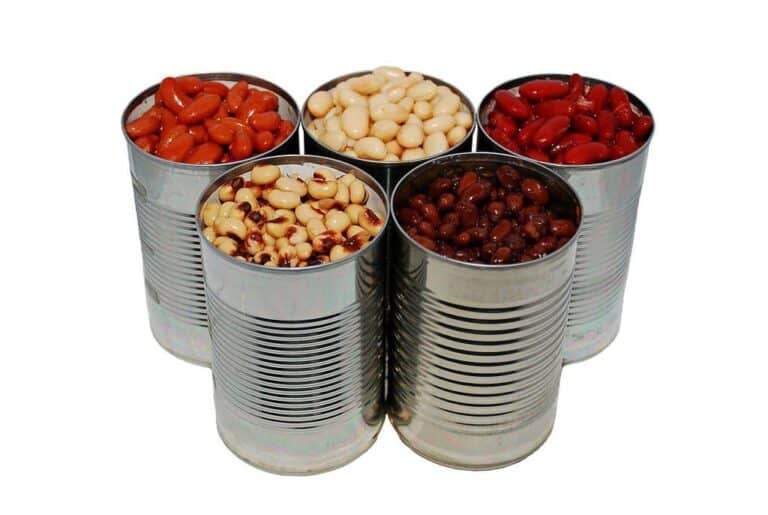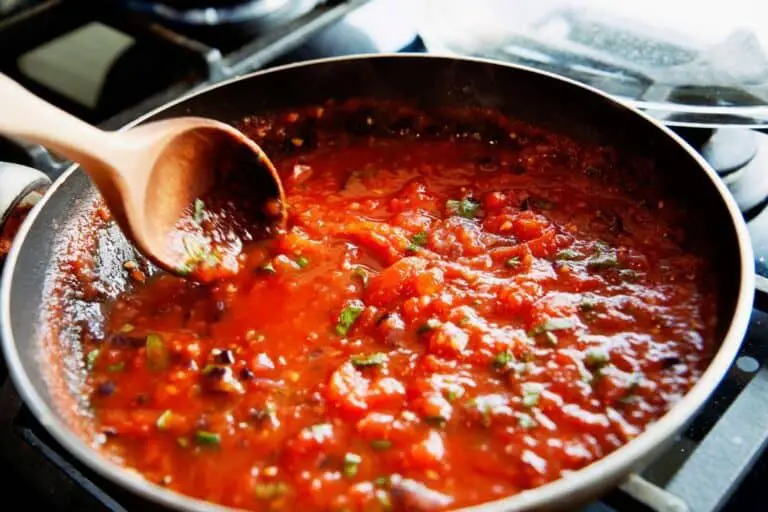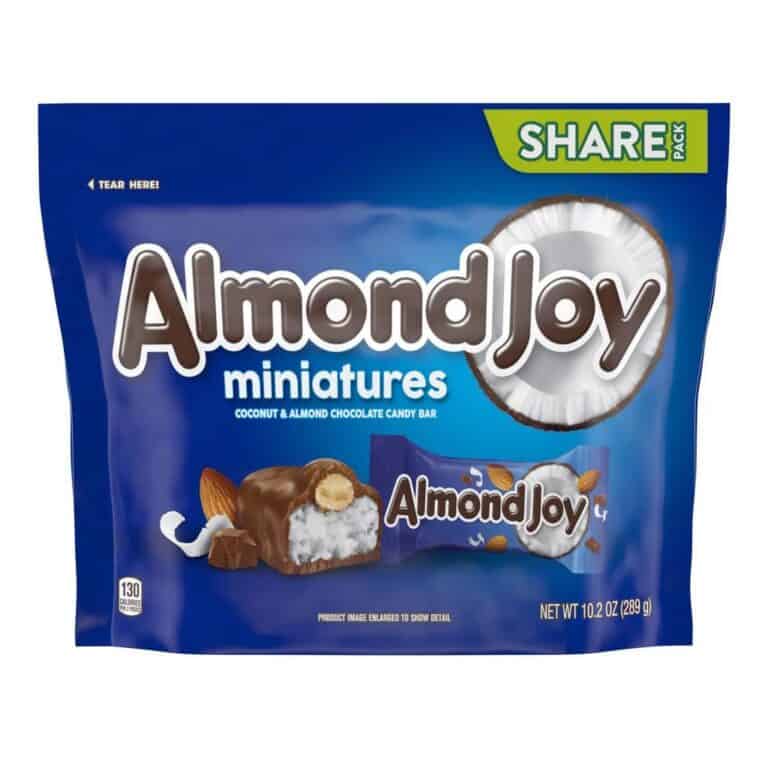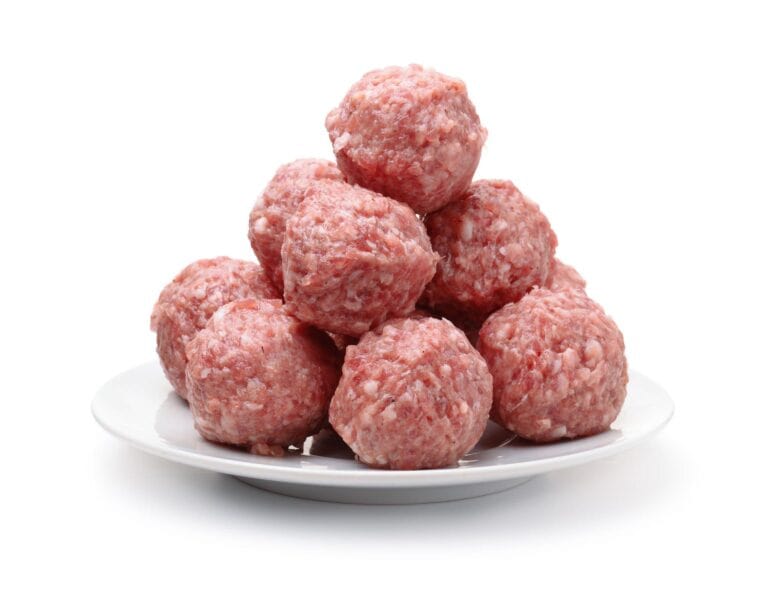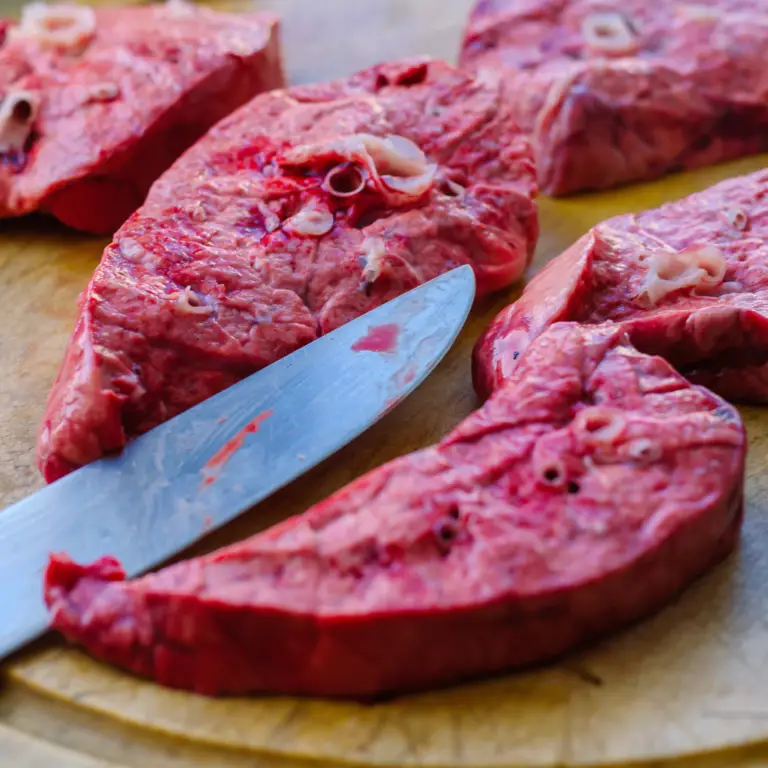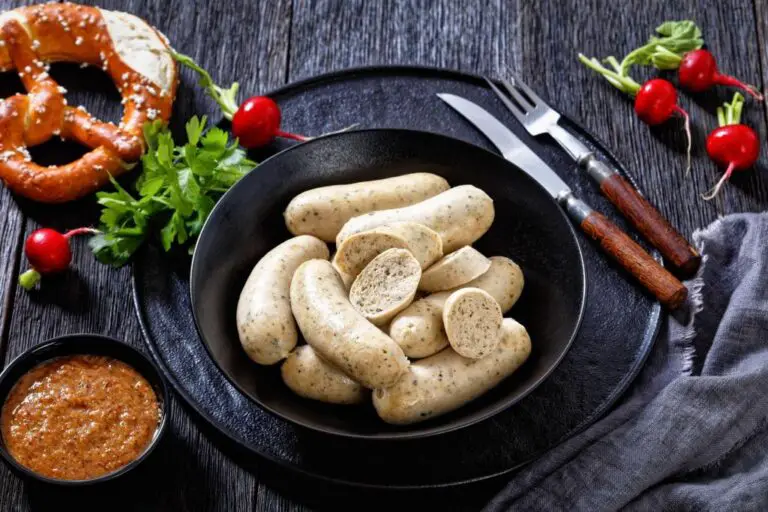Can You Eat Baked Beans Out of the Can? No Time to Cook
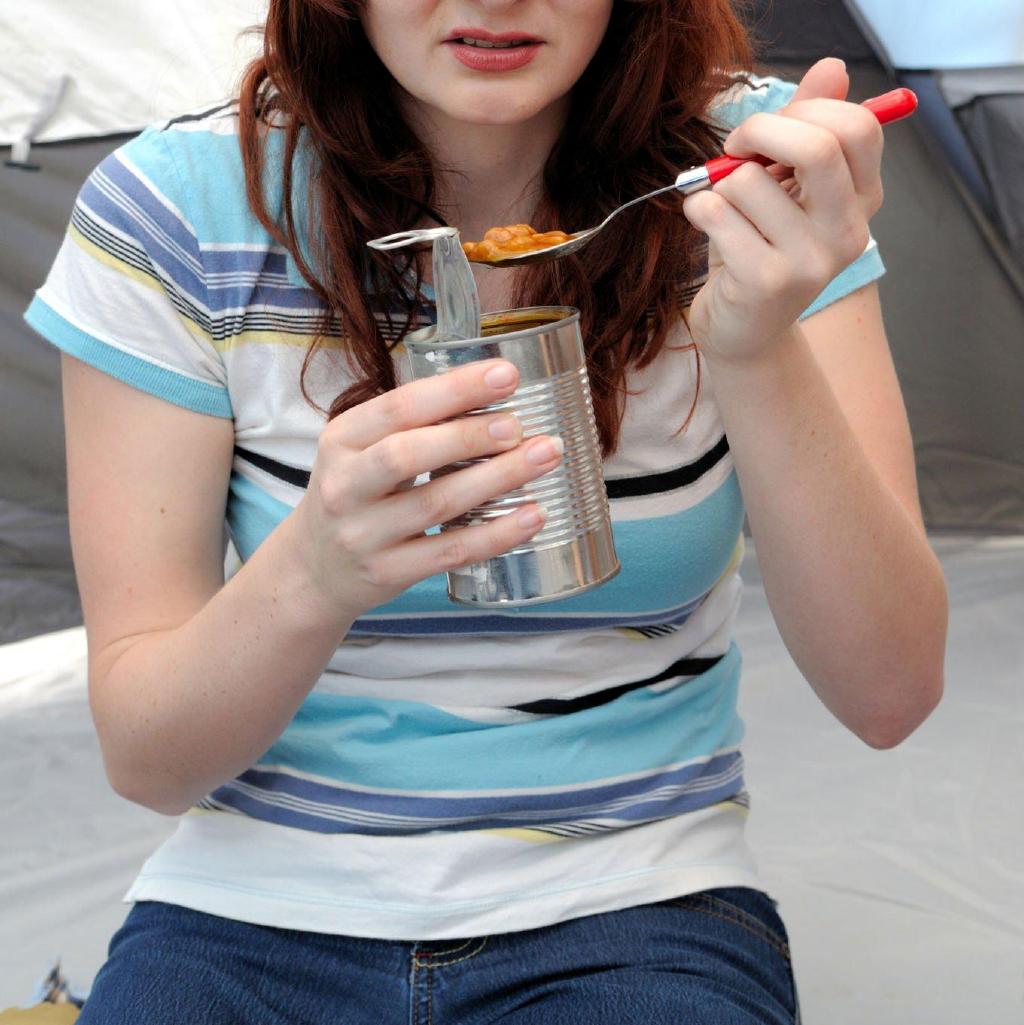
Picture this: you’re on a camping trip, and your hunger pangs hit hard. You have a can of baked beans in your hand, but no stove or microwave in sight. What do you do? Can you actually eat baked beans directly from the can, or is it a culinary no-no?
Canned beans are already cooked and safe to eat straight from the can. However, it is recommended to drain and rinse the beans before eating them, as canned beans typically come in a super-salty liquid
Baked beans, those humble yet oh-so-satisfying legumes, have been a pantry staple for generations. They embody comfort and convenience in equal measure, ready to rescue you from the clutches of a rumbling belly at a moment’s notice. But is it really as simple as cracking open a can and digging in?
In this tantalizing exploration, we will unravel the delicious mysteries of baked beans in a can. We’ll delve into the practicalities, the pros, and the cons, and we’ll even whisper some culinary secrets to transform this pantry favorite into a gourmet delight. So, brace yourself for a journey through the savory world of canned baked beans, where convenience meets culinary creativity.
The History of Baked Beans in Cans
The journey of baking beans in cans is a fascinating one that traces back to the early 19th century. These cans have played a pivotal role in shaping our eating habits, especially in situations where convenience takes precedence. But how did this all begin?
The story begins with the development of canning technology. In the early 1800s, a French chef named Nicolas Appert invented a method for preserving food in sealed glass jars, effectively kickstarting the canning revolution. In 1810, British merchant Peter Durand patented the tin can, a significant leap forward in food preservation.
The first canned foods were humble staples like fruits, vegetables, and meat. However, it wasn’t until the mid-1800s that baked beans made their canned debut. These ready-to-eat cans quickly became popular, especially in the United States.
Can You Eat Baked Beans Out of the Can?
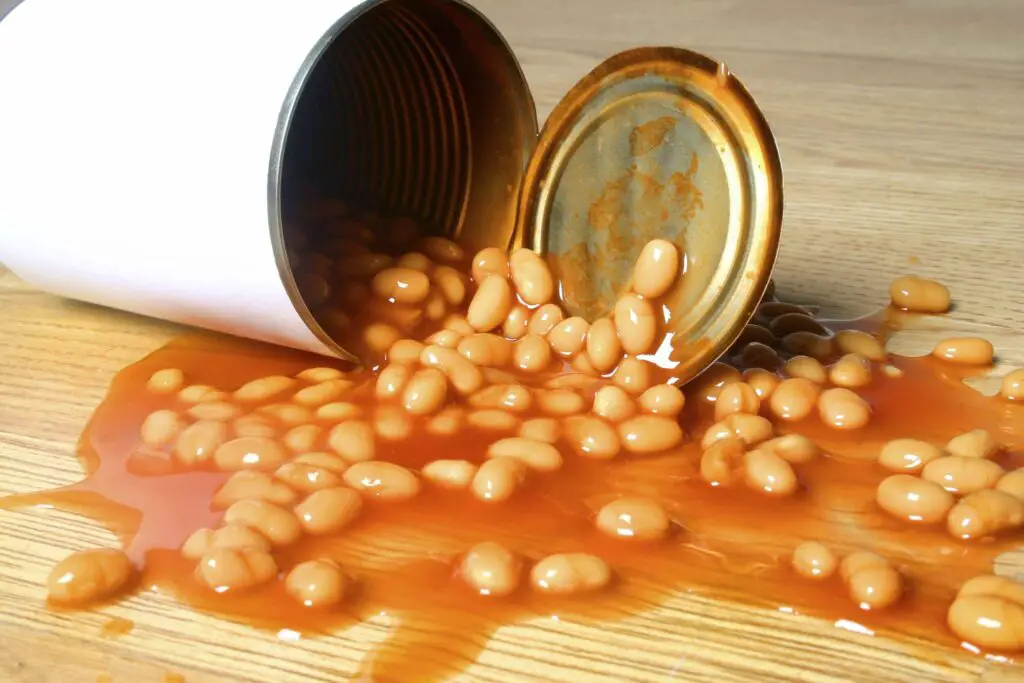
Canned beans are already cooked and safe to eat straight from the can. However, it is recommended to drain and rinse the beans before eating them, as canned beans typically come in a super-salty liquid; even varieties labeled “low sodium” can contain a significant amount of salt.
It is also worth noting that baked beans are usually served in a tomato sauce along with spices and seasonings such as paprika, onion powder, salt, and sugar. While baked beans can make up part of a balanced diet, it is best to eat them alongside foods such as vegetables, eggs, and slow-release carbohydrates to ensure a good balance of nutrients with not too much salt or sugar.
The Safety Concerns
Now, let’s address the elephant in the room: safety. Is it safe to scoop baked beans directly from the can into your mouth? Well, it depends on several factors, and it’s not a simple yes or no.
Contamination Risks: One of the primary concerns is contamination. When canned, baked beans are sealed in an airtight environment, designed to keep bacteria and other pathogens at bay. However, if the can is damaged, rusted, or compromised in any way, there’s a risk of contamination. Additionally, the can’s exterior may not always be pristine, so proper cleaning before consumption is crucial.
Hygiene Matters: Hygiene plays a significant role here. Ensure your hands are clean when handling the can. Using a clean utensil to scoop out the beans can further reduce the risk of contamination.
Nutritional Value of Canned Baked Beans
Baked beans are renowned for being a hearty and nutritious dish. They are a good source of protein, fiber, and various essential vitamins and minerals. But how do the nutritional aspects of canned baked beans compare to their traditionally prepared counterparts?
Nutritional Content: Canned baked beans generally retain much of their nutritional value. They are rich in protein, thanks to the beans themselves. In fact, a one-cup serving of canned baked beans can provide about 15 grams of protein, making it a substantial source for vegetarians and vegans.
| Nutrient | Canned Baked Beans (1 cup) | Traditional Baked Beans (1 cup) |
| Calories | 240 | 238 |
| Protein (g) | 14.7 | 14.5 |
| Fiber (g) | 9.2 | 9.8 |
| Carbohydrates (g) | 54.7 | 53.8 |
| Sugars (g) | 12.3 | 11.7 |
| Fat (g) | 0.8 | 0.8 |
As seen in the table, there are minimal differences in the nutritional content between canned and traditionally prepared baked beans. Canned beans are slightly higher in calories due to the canning process, but the protein, fiber, and other essential nutrients remain largely intact.
Pros and Cons of Eating from the Can
Now that we’ve delved into the history, safety concerns, and nutritional value of canned baked beans, it’s time to weigh the pros and cons of the practice of eating them directly from the can.
Pros of Eating from the Can:
- Convenience: This is perhaps the most significant advantage. Eating from the can requires no additional dishes or utensils. It’s ideal for situations like camping, hiking, or any scenario where minimal equipment is available.
- Quick and Easy: There’s no need to heat the beans or transfer them to another container. You can simply pop open the can and start eating, saving both time and energy.
- Portion Control: Canned baked beans come in convenient serving sizes, making it easy to manage portion control. You won’t accidentally make more than you can consume.
Cons of Eating from the Can:
- Safety Concerns: As discussed earlier, safety is a significant concern. There’s a risk of contamination if the can is damaged or not handled properly.
- Taste and Texture: Some argue that baked beans straight from the can lack the depth of flavor and texture that you get from heating them. The heat allows the flavors tomeld, and the beans to become softer and more tender.
- Digestibility: For some individuals, consuming cold canned beans may be harder to digest, potentially leading to discomfort or gas.
See also: Is It Bad to Eat an Entire Can of Beans?
Proper Baked Beans Can Handling and Preparation
If you decide that the convenience of eating baked beans from the can outweighs the potential downsides, it’s essential to follow proper handling and preparation guidelines to ensure your safety.
- Inspect the Can: Before opening, inspect the can for any signs of damage, rust, or bulging. These can indicate spoilage or contamination, and it’s best to avoid such cans.
- Clean the Lid: Use a clean cloth or paper towel to wipe the top of the can before opening it. This helps remove any dirt or potential contaminants that may have collected during storage.
- Use Utensils: Whenever possible, use a clean utensil to scoop out the beans instead of eating directly from the can. This reduces the risk of contamination from your hands.
- Store Leftovers Properly: If you don’t finish the entire can, transfer the remaining beans to a clean, airtight container and refrigerate them. Consume them within a few days to maintain freshness.
Alternative Serving Options
While eating baked beans straight from the can is a convenient choice, there are numerous creative ways to enjoy them that can enhance their flavor and appeal.
- Baked Bean Toast: Spread heated baked beans over toasted bread for a quick and delicious open-faced sandwich.
- Baked Bean Salad: Combine canned baked beans with fresh vegetables and a tangy vinaigrette to create a refreshing bean salad.
- Baked Bean Casserole: Layer canned baked beans with other ingredients like sausage or bacon, and bake for a hearty casserole.
- Baked Bean Toppings: Use baked beans as a topping for baked potatoes, hot dogs, or burgers to add flavor and texture.
- Baked Bean Dip: Blend canned baked beans with spices and cheese to create a flavorful dip for tortilla chips or vegetables.
These creative options can elevate the humble canned baked beans into a delightful meal or side dish.
Elevating Your Canned Baked Bean Experience
If you’re ready to take your canned baked beans to the next level, here are some creative ideas to consider:
1. Add Some Heat
Spice up your baked beans by adding a dash of hot sauce, chili powder, or red pepper flakes. The heat will complement the sweetness of the beans and give your taste buds a delightful kick.
2. Customize with Toppings
Consider adding toppings like shredded cheese, diced onions, or chopped cilantro to enhance both the flavor and presentation of your baked beans. These additions can turn a simple dish into an appetizing masterpiece.
3. Create a Baked Bean Casserole
Transform your canned baked beans into a hearty casserole by layering them with ingredients like ground beef, sausage, or diced vegetables. Top it off with a layer of cheese and bake until bubbly and golden brown for a satisfying meal.
4. Pair with Complementary Foods
Baked beans go wonderfully with a variety of other foods. Pair them with grilled
See also: Are Canned Beans Pressure Cooked?
FAQs in Is It Safe to Consume Canned Baked Beans
Can eating baked beans from a can lead to food poisoning?
Eating canned baked beans directly from the can is generally safe, as the canning process preserves the food. However, if the can is damaged, bulging, or shows signs of spoilage, it’s best to avoid consumption to prevent foodborne illness.
What are the health risks associated with consuming canned food without cooking?
Consuming canned food without cooking carries minimal health risks if the can is in good condition. However, cooking can enhance flavor and eliminate any potential bacteria on the surface.
Are there any specific brands of canned baked beans that are safe to eat directly from the can?
Most reputable brands produce canned baked beans safe for direct consumption. Always check for signs of damage or spoilage before eating.
Can you heat canned baked beans in the can, or is it better to transfer them to a different container?
It’s safer to transfer canned baked beans to a microwave-safe container before heating to prevent potential chemical reactions between the can and the microwave.
How long do canned baked beans last, and what are the signs they may have gone bad?
Canned baked beans typically have a long shelf life, often several years. Signs of spoilage include bulging cans, unusual odors, or visible mold.
Is it safe to eat baked beans straight from the can?
Yes, it’s generally safe to eat canned baked beans directly from the can if the can is in good condition.
What are some alternative serving ideas for canned baked beans to enhance their flavor and appeal?
Get creative! Add toppings like cheese, onions, or hot sauce. Use them in casseroles, pair them with grilled beef meats, or spread them on toast for a delicious twist. The options are endless.

